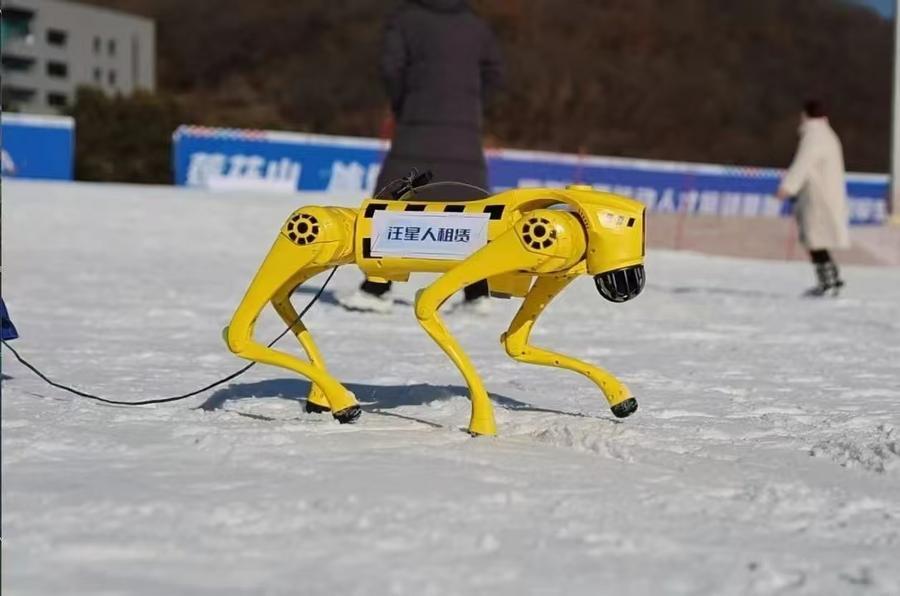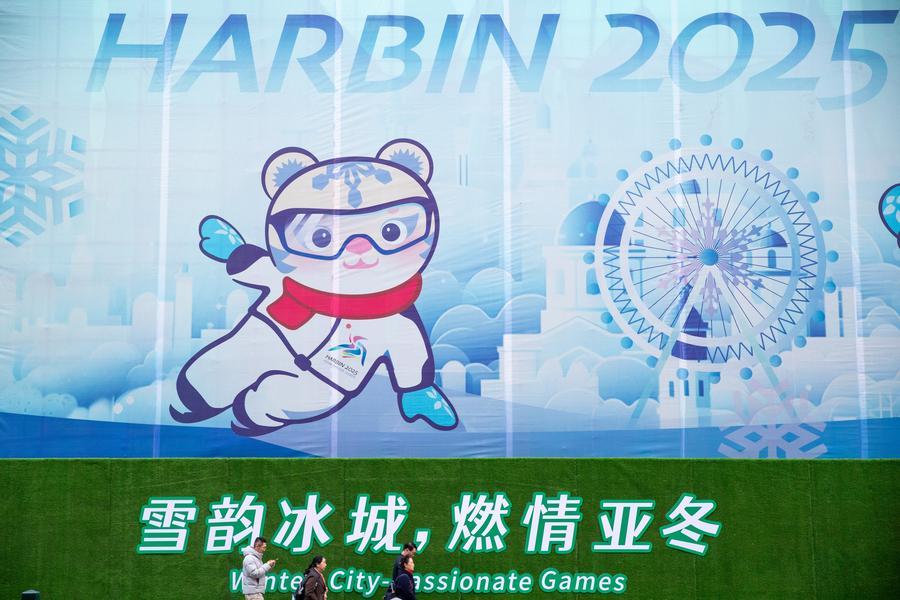
 0 Comment(s)
0 Comment(s) Print
Print E-mail Xinhua, November 24, 2024
E-mail Xinhua, November 24, 2024
At the ski resort of Lianhuashan in northeast China's Jilin Province, several silver robotic dogs conduct patrols, transport first-aid supplies and pose for photos with the skiers, who now enjoy not only winter sports, but also new services brought by high-tech products.
Winter sports have gained popularity in China in recent years, and people expect the ninth Asian Winter Games, slated for February 2025 in China's "Ice City" of Harbin in Heilongjiang Province, to give a further boost to these activities.
"I am sure that the new products can provide a better experience for visitors from around the world," said Liu Weizhe, a ski enthusiast.

A robotic dog performs at the ski resort of Lianhuashan in Changchun, northeast China's Jilin Province, Nov. 22, 2024. [Photo/Xinhua]
Hi-tech on the snow
Led by a robotic dog, Liu quickly completed the application procedure for a season pass, which he can use throughout the snow season.
He then took pictures of the dog, posting them on social media. "They are like flexible assistants, saving time and effort for customers," he wrote. "I was told that they can also patrol and rescue. They will definitely play a very big role, especially in extreme weather, making skiers feel safer."
Equipped with advanced sensors and imaging technology, these robotic dogs can participate in daily inspection, emergency rescue and other work, timely detecting the safety hazards in ski resorts, delivering first-aid supplies and guiding rescue workers to the scene, according to Su Zhongwei, marketing director with the Lianhuashan ski resort.
Noting that the robotic dogs can reduce the workload of humans, improve the operation efficiency of the resort and collect information which could be used for analysis of customers' demand, he disclosed that in the future the robotic dogs will also pull sleds and wear costumes in the northeast China style.
This is just one example how new technologies are being applied to winter sports amid the boom.
The city of Liaoyuan, also in Jilin Province, boasts the production capacity of around 3.5 billion pairs of cotton socks a year, and has been dubbed the "city of socks". The sock production park has embarked on a collaboration with the Winter Sports Administrative Center of China's General Administration of Sport, and developed yarn self-heating ice socks for Chinese athletes at the Beijing Winter Olympics.
"This year we have expanded our sales channels," said Bai Chunwei, sales manager of the Liaoyuan Northern Socks Industry Group's knitting company. "Consumers can buy either in ski resorts or online, with big discounts for livestreaming purchases."
Lin Ruoshan, a ski enthusiast from east China's Fujian Province more than 2,000 kilometers away, has purchased a lot of goods during the "Double 11" shopping spree. She has also booked ski tours, and now blasts down the trails at the Beidahu ski resort, wearing her helmet and goggles.
"I used to ski overseas. But in recent years domestic ski resorts have become a lot better, with some iconic tourist attractions such as Ice-Snow World increasingly appealing," she said.
According to Huang Zhongrui, marketing director of the Vanke Songhua Lake Resort, ticket sales there started a month earlier than in previous years, with the pre-sale volume up 40 percent year on year.
Boost from sports events
Data from the Ministry of Industry and Information Technology shows that the number of ice-and-snow equipment enterprises in China has grown from around 300 in 2015 to around 900 in 2023. Meanwhile, their sales revenue has grown from less than 5 billion yuan (about $690 million) in 2015 to around 22 billion yuan in 2023.
China has unveiled an ambitious plan to grow its ice-and-snow economy, targeting winter sports, tourism and equipment manufacturing as key drivers of economic growth, with a projected value of 1.5 trillion yuan by 2030.
Experts believe that people's growing passion for winter sports has been partially driven by the 2022 Beijing Winter Olympics.
"A series of events have promoted the accumulation of ice-and-snow tourism resources to north and northeast China, and the related industrial chain has been continuously improved," said Jiang Yiyi, an expert with the Beijing Sport University.
China's northernmost province of Heilongjiang views the ninth Asian Winter Games as a booster to its burgeoning ice-and-snow market.

People pass by a billboard on the 9th Asian Winter Games Harbin 2025 in Harbin, northeast China's Heilongjiang Province, Oct. 29, 2024. [Photo/Xinhua]
Earlier this month, it launched a 100-day winter tourism initiative, unveiling a slew of preparations for better receiving international visitors for the winter sports gala.
"We have set up an arrival-and-departure command center for cross-sectoral liaisons involving civil aviation, airports, railways, public security and customs departments, to facilitate international arrivals and departures," said Cao Ru, the head of external liaison for the event's organizing committee.
Heilongjiang has installed 1,391 POS machines accepting foreign bank cards, 70 foreign currency exchange points and ATMs in hotels and tourist attractions to ensure the convenience of payments for inbound tourists.
Meanwhile, key scenic spots in the province are providing multilingual interfaces for online bookings.
During the winter season, the authorities have coordinated with homestays, schools, government agencies, enterprises and institutions to open accommodation and parking spaces to cope with the influx of tourists.
Walking into an Asian Winter Games licensed merchandise retail store in central Harbin, the provincial capital, one is dazzled by the range of creative products, including exquisite brooch badges, lovely crossbody bags and furry dolls.
More than 1,600 licensed creative products have been launched, which are available both in 209 stores and online, with their pre-sale income standing at about 290 million yuan.
Li Mingzhen is head of an ice-and-snow equipment factory named Longze in Jilin, which was authorized to produce some of the Asian Winter Games gloves.
"By sponsoring events and launching customized ice-and-snow equipment, our brand will be significantly promoted," he told Xinhua.